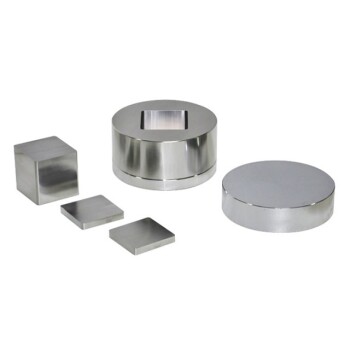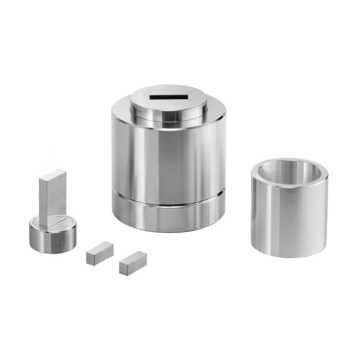In short, industries that rely on precise material testing, research and development, and small-scale production benefit the most from laboratory presses. Key sectors include pharmaceuticals, rubber and plastic molding, composites, aerospace, and laminating, where the ability to create controlled, repeatable samples is critical for innovation and quality assurance.
The true value of a laboratory press isn't just in the industries it serves, but in the function it performs: providing a controlled environment of heat and pressure to transform raw materials into testable, usable forms for research, quality control, and prototyping.

The Core Function: Creating Precise Samples Under Pressure
A laboratory press is fundamentally a tool for applying controlled force and temperature to a material. This process is essential for preparing samples for a wide range of analyses and for creating initial prototypes.
Material Testing and Quality Control
Industries need to verify that their materials meet specific performance standards. A lab press is used to mold a material, such as a polymer or rubber, into a standardized shape like a plaque or puck.
This sample is then subjected to further testing to measure properties like tensile strength, flexibility, chemical resistance, and durability. This ensures batch-to-batch consistency and adherence to quality specifications.
Research & Development (R&D)
Developing new materials is the lifeblood of innovative industries. A lab press allows researchers to create small, testable samples of new formulations quickly and cost-effectively.
This is crucial in fields like aerospace and advanced composites, where new materials must be tested for performance under extreme conditions before being considered for larger applications. It's also vital in pharmaceuticals for preparing samples for analytical techniques.
Prototyping and Short-Run Production
Before investing in expensive mass-production tooling, companies use lab presses to create functional prototypes or produce a limited number of specialized parts.
This is common in the laminating industry for creating items like ID cards and credit cards, or in the medical field for prototyping new device components.
A Closer Look at Key Industries
While the applications are broad, several industries have integrated laboratory presses as standard, indispensable equipment.
Polymers, Rubber, and Composites
This is perhaps the most common application. Lab presses are used to mold uncured rubber, thermoplastic resins, and composite materials into test specimens. This allows manufacturers to perfect cure times, temperatures, and formulations for optimal product performance.
Pharmaceuticals
In the pharmaceutical industry, presses are used to form pellets from powdered samples (like KBr pellets for FTIR spectroscopy) for chemical analysis. They are also used to test compaction properties of formulations for tablets and drug delivery systems.
Aerospace and Advanced Ceramics
The aerospace industry relies on high-performance composites and ceramics that are both lightweight and incredibly strong. Laboratory presses are critical for R&D, helping engineers develop and test new materials that can withstand extreme temperatures and mechanical stress.
Laminating and Electronics
Any process involving bonding layers of material together with heat and pressure can benefit from a lab press. This includes the manufacturing of credit cards, ID badges, and even multi-layered circuit boards in the electronics industry.
Understanding the Operational Context
Laboratory presses are defined as much by how they are used as by what they produce. Their value is maximized in specific manufacturing and testing philosophies.
The Role in Lean and Cell Manufacturing
Lab presses are ideal for lean manufacturing environments and dedicated work cells. Their relatively small footprint and versatility allow them to be integrated into a specific process for short, specialized production runs without disrupting a larger manufacturing line.
The Limitation: Not for Mass Production
The key trade-off of a laboratory press is speed versus precision. It is not a tool for high-volume, continuous manufacturing.
Its strength lies in its meticulous control over pressure, temperature, and time, making it perfect for development and testing, where accuracy is more important than output volume.
Making the Right Choice for Your Goal
To determine if a laboratory press fits your needs, consider your primary objective.
- If your primary focus is material development and R&D: A lab press is an essential tool for rapidly creating and iterating on testable samples of new formulations.
- If your primary focus is quality control and testing: A press provides a standardized, repeatable method for preparing specimens, ensuring your materials consistently meet quality standards.
- If your primary focus is small-scale or prototype production: A lab press offers a cost-effective solution for creating limited runs of specialized items like laminated products or molded components.
Ultimately, any industry that needs to understand, validate, or innovate on the physical properties of a material will find a laboratory press to be an indispensable asset.
Summary Table:
| Industry | Primary Use Cases |
|---|---|
| Pharmaceuticals | Pellet formation for analysis, tablet compaction testing |
| Polymers, Rubber, Composites | Molding test specimens, optimizing formulations |
| Aerospace | R&D for high-performance materials under extreme conditions |
| Laminating and Electronics | Bonding layers for ID cards, circuit boards |
| General R&D | Prototyping, small-scale production, quality assurance |
Ready to enhance your lab's capabilities with precision and efficiency? KINTEK specializes in lab press machines, including automatic lab presses, isostatic presses, and heated lab presses, designed to meet the demanding needs of industries like pharmaceuticals, aerospace, and composites. Whether you're focused on material testing, R&D, or prototyping, our equipment delivers reliable, repeatable results to drive innovation and quality assurance. Contact us today to discuss how we can support your laboratory goals and boost your productivity!
Visual Guide

Related Products
- Automatic Laboratory Hydraulic Press Lab Pellet Press Machine
- Laboratory Hydraulic Press 2T Lab Pellet Press for KBR FTIR
- Manual Laboratory Hydraulic Press Lab Pellet Press
- Automatic Laboratory Hydraulic Press for XRF and KBR Pellet Pressing
- Manual Heated Hydraulic Lab Press with Integrated Hot Plates Hydraulic Press Machine
People Also Ask
- What feature of the hydraulic portable press helps monitor the pellet-making process? Discover the Key to Precise Sample Preparation
- What are the limitations of hand-operated presses? Avoid Sample Compromise in Your Lab
- What are the key steps for making good KBr pellets? Master Precision for Flawless FTIR Analysis
- What are the advantages of using a hydraulic press for pellet production? Achieve Consistent, High-Quality Samples
- How do hydraulic pellet presses contribute to material testing and research? Unlock Precision in Sample Prep and Simulation



















